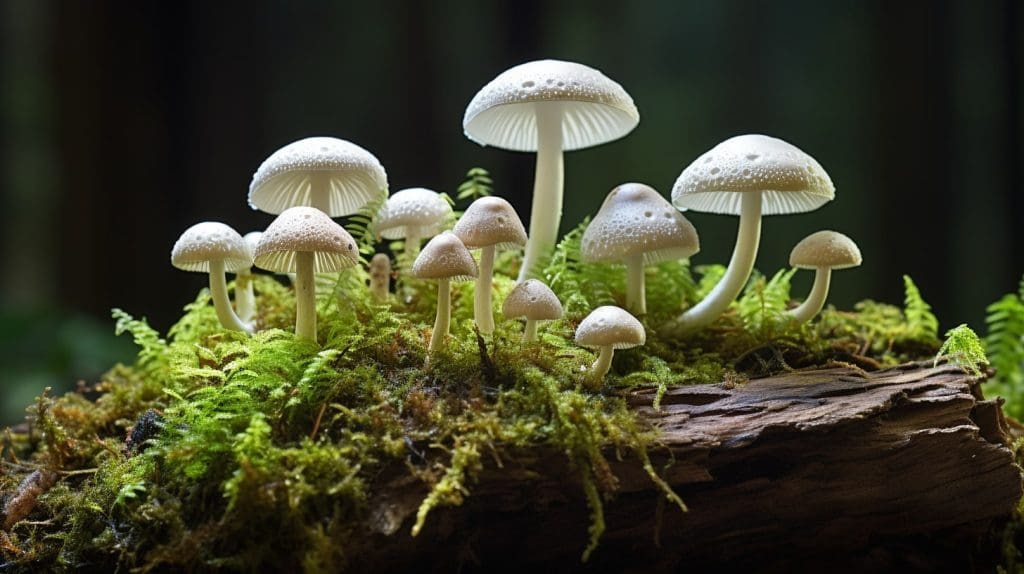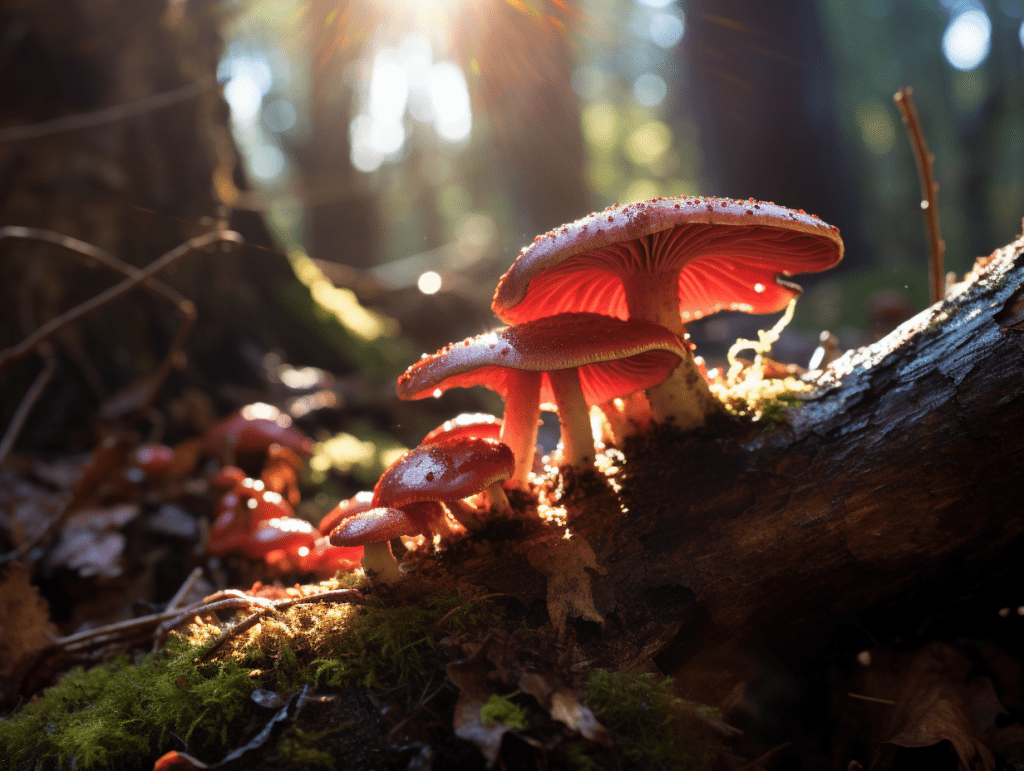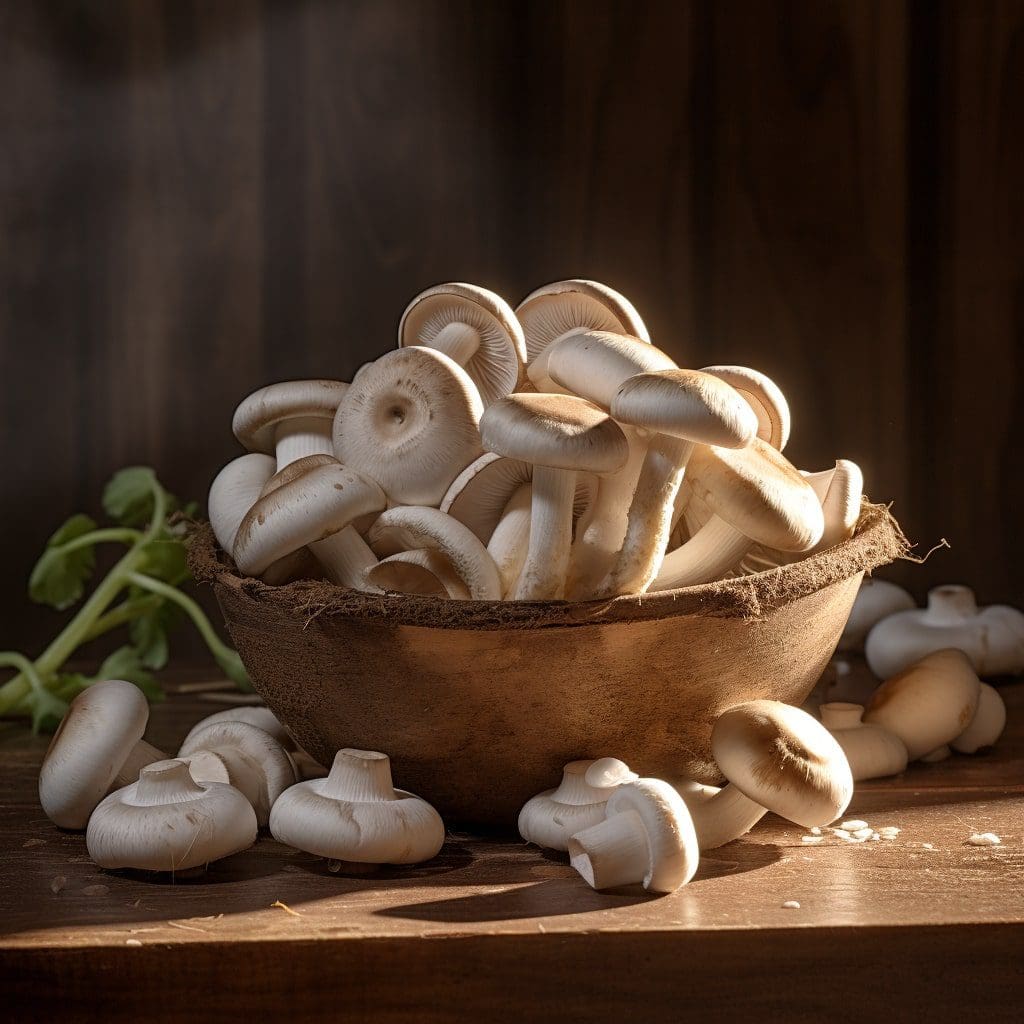Did you know that eating a neurotoxic mushroom in your backyard could cause common symptoms in your furry friend? It’s true! Dogs, just like humans, can fall victim to the toxic effects of ingesting liver toxins from wild mushrooms found in grassy areas. The other day, my dog ate a mushroom in the grass, it served as a stark reminder of how important vigilance is. Before you let your four-legged companion roam freely, it’s crucial to educate yourself about the potential dangers these innocent-looking fungi can cause.

Studies have shown that eating certain neurotoxic wild mushrooms can be harmful to both dogs and humans. While some mushrooms may only cause mild gastrointestinal upset, others can lead to organ failure or even be fatal for our beloved pets. The consequences of mushroom ingestion should not be taken lightly. It’s important to be cautious when encountering mushrooms, as they may appear harmless in photos but can be dangerous things to consume.
Imagine your dog innocently exploring the grassy terrain when suddenly they stumble upon a tempting mushroom. Without knowing any better, they gobble it up within seconds. This scenario is more common than you might think, especially during turkey season when dogs can be exposed to liver toxins that can lead to liver failure. Dogs are naturally curious creatures and often find themselves at risk without their human companions realizing it. Be vigilant and keep an eye on your furry friend, especially during these hours of potential danger.
To ensure your dog’s safety, it is essential to take preventive measures against mushroom ingestion. By familiarizing yourself with the types of wild mushrooms commonly found in your area, such as turkey mushrooms, and learning how to identify them, you can effectively reduce the risk of accidental consumption of liver toxins. Take a few hours to educate yourself on this important topic.
Remember,Knowledge is power! So let’s jump right in and uncover the hidden risks lurking beneath those innocent-looking fungi.
Stay tuned for our next section where we’ll discuss the various types of toxic wild mushrooms and their potential effects on dogs’ health.
Signs of Mushroom Toxicity in Dogs
If you suspect that your furry friend has ingested a mushroom while frolicking in the grass, it’s crucial to be aware of the signs of mushroom toxicity in dogs. Prompt recognition and immediate veterinary care can make all the difference. Let’s delve into the symptoms of mushroom poisoning and why early intervention is vital for their recovery.
Symptoms of Mushroom Poisoning
Mushroom poisoning can manifest in various ways, affecting different systems within your dog’s body. Keep an eye out for these common signs:
- Gastrointestinal Distress: Vomiting, diarrhea, and abdominal pain are typical symptoms of mushroom toxicity in dogs. If you notice your pup experiencing any digestive discomfort after consuming a mystery mushroom, it should raise concerns.
- Neurological Signs: Some mushrooms contain toxins that affect the nervous system, leading to neurological symptoms in dogs. These may include excessive drooling, tremors, seizures, or even coma. If your pet displays any abnormal behavior or seems disoriented after munching on a suspicious fungus, seek immediate veterinary attention.
The Importance of Early Recognition and Treatment
Recognizing the signs of mushroom toxicity as soon as possible is crucial for ensuring your dog receives prompt medical care. Delayed treatment can worsen their condition and potentially lead to severe complications or even death.
Swift action is necessary to prevent dehydration and further damage to their digestive system. Vomiting and diarrhea can quickly deplete fluids from their body, making intravenous fluid therapy essential for rehydration.
Neurological signs resulting from toxic mushrooms demand urgent attention as well since they indicate potential damage to the central nervous system (CNS). Seizures or tremors could escalate rapidly without intervention, posing significant risks to your pet’s health. A veterinarian will assess their neurological status and provide appropriate treatment to manage these symptoms effectively.
Improving Your Dog’s Chances of Recovery
Timely identification of mushroom poisoning in dogs significantly improves their chances of recovery. When you notice any signs or suspect your dog has ingested a toxic mushroom, follow these steps:
- Don’t Delay: Waste no time in contacting your veterinarian or an emergency animal clinic. Provide them with all the necessary details, including the symptoms observed and the suspected ingestion of mushrooms.
- Avoid Home Remedies: While it may be tempting to try home remedies or induce vomiting yourself, it is best to seek professional advice first. Certain toxins found in mushrooms can cause further harm if not handled properly.
- Bring Mushroom Samples: If possible, collect a sample of the mushroom your dog consumed or take clear photographs for identification purposes. This information will assist the veterinarian in determining the specific toxin involved and tailoring treatment accordingly.
- Follow Veterinary Recommendations: Once at the clinic, your veterinarian will assess your dog’s condition and administer appropriate treatments based on their symptoms and toxin exposure. Follow their instructions diligently to ensure your furry companion receives optimal care.
Remember that prevention is always better than cure. Familiarize yourself with the varieties of toxic mushrooms commonly found in your area and take preventive measures during walks or outdoor playtime with your pet.
What to Do If Your Dog Eats a Mushroom in the Grass
Act fast: Call your vet immediately!
If you suspect that your furry friend has chowed down on a wild mushroom while frolicking in the grass, don’t waste any time. Grab your phone and dial up your veterinarian right away. They are the best person to guide you through this potentially dangerous situation. Mushrooms can be toxic to dogs, so it’s crucial to seek professional advice as soon as possible.
Don’t try to make them puke without expert guidance
While inducing vomiting might seem like a logical step, hold your horses! It’s important not to attempt this without proper guidance from your vet. Some mushrooms contain toxins that can cause harm when regurgitated. In fact, inducing vomiting in certain cases may actually worsen the situation and lead to more complications for your pup. So, resist the urge to play doctor and let the professionals advise you on what steps to take next.
Preserve evidence: Collect or photograph the mushroom
To help your veterinarian determine the severity of the situation and provide appropriate treatment, it’s essential to collect a sample or snap a clear photo of the mushroom ingested by your dog. This will assist in identifying its species and allow for better understanding of potential toxicity levels. Remember, different types of mushrooms can have varying effects on dogs, so every detail counts.
When collecting a sample, use gloves or a plastic baggie to avoid direct contact with the mushroom. Place it in a secure container or sealable bag for safekeeping until you can show it to your vet. If taking a photo is more convenient or if you’re unsure about handling wild mushrooms safely, grab your smartphone and capture several clear images from different angles. These visual references will still be valuable for identification purposes.
Follow instructions while waiting for further advice
Once you’ve contacted your vet and shared the necessary information, it’s time to follow their instructions while you wait for further advice. They may ask you to monitor your dog closely for any changes in behavior or symptoms. Be prepared to describe any unusual signs you observe, such as vomiting, diarrhea, excessive drooling, or lethargy. Providing accurate and timely updates will assist your veterinarian in making informed decisions regarding the next steps.
In the meantime, keep a watchful eye on your furry companion and ensure they have access to fresh water. Avoid giving them any additional food until you receive guidance from your vet. Remember that patience is key during this waiting period. While it can be nerve-wracking to see your beloved pet go through this ordeal, staying calm and following professional advice is crucial for their well-being.
Identifying Toxic Mushrooms: Appearance and Symptoms
Toxic mushrooms can be a real headache to identify, especially. These sneaky little fungi come in all sorts of shapes, sizes, and colors, making visual identification quite the challenge. So, if your furry friend has had an unfortunate encounter with a wild mushroom while frolicking in the grass, it’s important to know what signs to look out for.
Some toxic mushroom species have distinct characteristics that set them apart from their harmless counterparts. Bright colors or unusual shapes are often telltale signs that you might be dealing with a toxic mushroom. Take the infamous Amanita mushrooms as an example. With their striking red caps covered in white dots, they’re hard to miss! But remember, not all toxic mushrooms are as flashy as these deadly beauties. Some can blend seamlessly into their surroundings, making them even more dangerous.
There’s no one-size-fits-all answer. The effects can vary significantly depending on the specific species and toxins involved. Some mushrooms contain neurotoxic compounds that can wreak havoc on your pup’s nervous system, leading to tremors, seizures, or even paralysis. Others may cause gastrointestinal distress such as vomiting or diarrhea. In severe cases or with certain mushroom species, ingesting them could result in organ failure and even death.
Accurate identification of toxic mushrooms is best left to the experts who specialize in mycology—the study of fungi. Attempting to identify them yourself based solely on appearance can be risky business since many edible and non-toxic mushrooms share similar characteristics with their poisonous counterparts. It’s like playing a game of culinary Russian roulette! To avoid any mishaps or misidentifications that could put your doggo’s health at risk, consult with professionals who possess extensive knowledge about different mushroom species.
In some cases where immediate action is required, it’s essential to act swiftly and contact a veterinary professional. They can guide you through the necessary steps to mitigate the potential harm caused by toxic mushrooms. Remember, time is of the essence when dealing with mushroom toxicity.
If you’re determined to take matters into your own hands, there are a few precautions you can take before seeking expert advice. Start by taking clear photos of the mushroom in question from various angles. This will help mycologists or veterinarians identify the species more accurately and provide appropriate guidance. However, keep in mind that photographs alone may not always be sufficient for a definitive identification.
Common Treatments for Dog Mushroom Poisoning
It is crucial to act quickly and seek veterinary care. Treatment options for mushroom poisoning can vary depending on factors such as the type of mushroom ingested and the severity of symptoms.
Inducing Vomiting: A Swift Response
One of the first steps in treating a dog that has eaten a poisonous mushroom is inducing vomiting. This can help remove any remaining toxins from the stomach before they are absorbed into the bloodstream. However, it is important to note that inducing vomiting should only be done under veterinary supervision, as certain mushrooms may cause additional harm when regurgitated.
To induce vomiting, your veterinarian may administer medication or use other methods such as hydrogen peroxide. The goal is to safely expel the contents of the stomach containing the toxic substances. It is essential not to attempt this at home without professional guidance, as incorrect dosage or inappropriate methods could lead to further complications.
Activated Charcoal: Absorbing Toxins
Another treatment option commonly used for mushroom poisoning in dogs is administering activated charcoal. Activated charcoal works by binding to toxins in the gastrointestinal tract, preventing their absorption into the bloodstream. This can help reduce the potential damage caused by poisonous mushrooms.
Your veterinarian may administer activated charcoal orally or through a feeding tube if necessary. The dosage will depend on your dog’s size and condition. It’s important to note that activated charcoal should only be given under veterinary supervision, as improper administration or dosage could be ineffective or even harmful.
Supportive Care: Providing Comfort and Monitoring
In addition to specific treatments like inducing vomiting and administering activated charcoal, providing supportive care plays a vital role in managing mushroom poisoning in dogs. Supportive care involves addressing symptoms and ensuring your dog’s overall well-being during the recovery process.
Supportive care may include intravenous (IV) fluids to maintain hydration and flush out toxins. IV fluids can help support kidney function and prevent dehydration, which is especially important if your dog has been experiencing vomiting or diarrhea. Your veterinarian may also administer medications to alleviate symptoms such as nausea or abdominal pain.
Emergency Veterinary Intervention: Prompt Action
In cases of mushroom poisoning, emergency veterinary intervention is often necessary due to the potential complications that can arise. Time is of the essence. Even if your dog appears fine initially, some toxic mushrooms have delayed effects that could be life-threatening.
Upon arrival at the veterinary clinic, they will evaluate your dog’s condition and determine the most appropriate course of action. This may involve immediate treatments such as inducing vomiting or administering activated charcoal. The veterinarian will closely monitor your dog’s vital signs and provide any necessary interventions to ensure their safety and well-being.
Follow-Up Care: Monitoring Health
Once initial treatment has been administered, follow-up care becomes crucial in monitoring your dog’s health after mushroom poisoning. Regular monitoring of liver function tests and kidney health helps identify any long-term complications that may arise from mushroom toxicity.
Your veterinarian may recommend periodic blood tests to assess liver enzymes and kidney function over a specific period. These tests can provide valuable insights into how your dog’s body is recovering from the toxic exposure. Early detection of any abnormalities allows for timely intervention and appropriate adjustments in treatment plans if needed.
Dangerous Mushrooms for Dog Poisoning
Certain mushrooms, such as Amanita species, are highly toxic to dogs and can be fatal.

Let’s talk about some poisonous mushrooms that can pose a serious threat to our furry friends. One of the most dangerous types is the Amanita species. These mushrooms contain toxins that can have devastating effects on dogs if ingested. The toxins in Amanita mushrooms affect various organs in the body, including the liver and kidneys, leading to severe damage and even death.
It’s important to note that not all mushrooms are created equal. While some may cause mild gastrointestinal upset, others like the Amanita species can be life-threatening. Therefore, it is crucial for dog owners to be able to identify these dangerous mushrooms and take immediate action if their pet has consumed them.
Other dangerous mushrooms include the Death Cap and the Destroying Angel.
In addition to Amanita species, there are two other types of mushrooms that are particularly hazardous for dogs: the Death Cap and the Destroying Angel. Both of these varieties contain potent toxins that can wreak havoc on a dog’s system.

The Death Cap mushroom (Amanita phalloides) is responsible for numerous cases of mushroom poisoning in dogs each year. It contains amatoxins, which can lead to severe liver damage if ingested. Symptoms may not appear immediately after ingestion but can manifest within 6-24 hours. It’s important for dog owners to recognize signs such as vomiting, diarrhea, abdominal pain, jaundice (yellowing of skin/eyes), and lethargy – these could indicate mushroom poisoning from a Death Cap mushroom.

Similarly, the Destroying Angel (Amanita bisporigera) is another highly toxic mushroom that poses a significant risk to dogs’ health. It contains amatoxins like the Death Cap mushroom and affects vital organs such as the liver and kidneys. The symptoms of poisoning from this mushroom are similar to those caused by the Death Cap, including gastrointestinal distress and liver damage.
These toxic varieties contain harmful substances that can cause severe organ damage.
The reason why these poisonous mushrooms are so dangerous for dogs lies in the harmful substances they contain. Amanita species, Death Caps, and Destroying Angels all produce toxins known as amatoxins. These toxins specifically target the liver cells and interfere with their normal functioning.
When a dog ingests these toxic mushrooms, the amatoxins are absorbed into their bloodstream and quickly distributed throughout the body. Once they reach the liver, they disrupt essential processes, leading to cell death and severe organ damage. If left untreated, this can result in liver failure or even death.
It’s important to understand that even a small amount of these toxic mushrooms can be lethal to dogs. Therefore, prevention is key.
It’s crucial to be aware of these specific mushrooms and take precautions to prevent your dog from ingesting them.
To keep your dog safe from mushroom poisoning, it’s vital to be proactive and take necessary precautions:
- Know your mushrooms: Educate yourself about different types of poisonous mushrooms in your area, especially Amanita species, Death Caps, and Destroying Angels.
- Inspect your surroundings: Regularly check your yard or any outdoor areas where your dog spends time for any signs of potentially toxic mushrooms.
- Remove mushrooms promptly: If you find any suspicious-looking mushrooms growing in your yard or nearby areas where your dog has access, remove them immediately.
- Keep an eye on walks: When taking your dog for a walk or hike in wooded areas or parks, stay vigilant for any hazardous mushrooms along the way.
- Training is key: Teach your dog commands like “leave it” or “drop it” so that you can quickly intervene if they show interest in mushrooms during your outdoor adventures.
- Contact poison control: If you suspect your dog has ingested a poisonous mushroom, contact your veterinarian or a poison control center right away for guidance on what steps to take.
Managing Liver and Kidney Health in Dogs after Mushroom Consumption
The Dangers of Mushroom Poisoning
Mushroom poisoning can have devastating effects on a dog’s liver and kidneys. When dogs ingest toxic mushrooms found in the grass or other outdoor areas, they are at risk of severe liver damage, kidney failure, and other life-threatening complications. As responsible pet owners, it is crucial to understand the importance of managing liver and kidney health after such an incident.
Seeking Veterinary Guidance for Monitoring
After your dog has consumed a mushroom, seeking immediate veterinary guidance is critical. A veterinarian will be able to assess the situation and provide appropriate advice tailored to your dog’s specific needs. They may recommend monitoring liver function tests and kidney health through regular check-ups.
Liver function tests help evaluate how well the liver is functioning by measuring certain enzymes and proteins in the blood. These tests play a vital role in identifying any abnormalities caused by ingesting harmful substances like mushroom toxins. Regular monitoring allows veterinarians to track progress and take necessary steps to ensure your dog’s organ recovery.
Special Diets and Medications for Organ Recovery
In some cases, special diets or medications may be prescribed to support your dog’s organ recovery process. These interventions aim to alleviate stress on the liver and kidneys while promoting healing. The specific diet or medication recommended will depend on the severity of the mushroom poisoning and individual factors related to your dog’s overall health.
A carefully formulated diet can help reduce strain on the organs by providing easily digestible nutrients that support their natural functions. This may include ingredients that are gentle on the stomach while still providing essential vitamins, minerals, and antioxidants necessary for healing.
Medications prescribed by a veterinarian can aid in detoxifying the body from harmful substances present in mushrooms. These medications may also help boost your dog’s immune system response during recovery. It is crucial to follow all veterinary instructions regarding dosage and administration for optimal results.
Regular Check-ups for Long-Term Health
Even after your dog has recovered from mushroom poisoning, regular check-ups are necessary to ensure long-term liver and kidney health. These check-ups allow veterinarians to monitor any potential long-lasting effects of the toxin ingestion and catch any underlying issues early on.
During these visits, your veterinarian may perform additional liver function tests and kidney health evaluations to ensure there are no lingering complications. They will also assess your dog’s overall well-being and provide guidance on maintaining a healthy lifestyle moving forward.
Risks of Reishi Mushrooms for Dogs

Potential Negative Effects on Blood Clotting
Reishi mushrooms have gained popularity in recent years due to their potential health benefits for humans. However,Caution is advised. Some studies suggest that these mushrooms could negatively affect a dog’s blood clotting ability, posing serious risks to their health.
Blood clotting plays a crucial role in the body’s ability to heal wounds and prevent excessive bleeding. Any disruption in this process can lead to severe complications. While more research is needed to fully understand the impact of reishi mushrooms on dogs’ blood clotting, it is essential to err on the side of caution.
Consult with Your Veterinarian
Before introducing any new supplements or medicinal mushrooms into your dog’s diet, it is vital to consult with your veterinarian. They are well-equipped to provide expert advice tailored specifically to your pet’s needs. Your vet will consider factors such as your dog’s age, breed, overall health, and any pre-existing conditions before making recommendations.
While alternative treatments may seem appealing, especially if you’ve heard about the potential benefits of reishi mushrooms for humans, remember that dogs have different physiological systems and metabolisms. What might be safe for us may not necessarily be safe for our four-legged companions. Prioritizing your dog’s safety should always be the top priority.
Ensuring Your Dog’s Safety
When considering alternative treatments or supplements for your dog, it is important to take certain precautions:
- Research Thoroughly: Conduct extensive research on any supplement or mushroom you plan on introducing into your dog’s diet. Look for reputable sources and scientific studies that support its safety and efficacy.
- Start Slowly: If you decide to incorporate reishi mushrooms or any other supplement into your dog’s routine under veterinary guidance, start with small amounts and closely monitor their response. Watch out for any adverse reactions or changes in behavior.
- Observe for Allergies: Dogs, like humans, can have allergies to certain substances. Keep a close eye on your dog after introducing reishi mushrooms and look out for signs of allergic reactions such as itching, hives, or difficulty breathing. If you notice any concerning symptoms, contact your veterinarian immediately.
- Monitor Blood Clotting: If your dog is already on medication that affects blood clotting or has a bleeding disorder, it becomes even more crucial to monitor their blood clotting ability closely when introducing reishi mushrooms or any other new supplement.
- Be Wary of Wild Mushrooms: While reishi mushrooms are generally considered safe for humans and dogs when properly prepared and administered in controlled amounts, it’s important to note that not all mushrooms are safe. Some wild mushrooms can be highly toxic to dogs and cause severe illness or even death. Always keep a close eye on your dog during walks or outdoor playtime to prevent them from ingesting unknown mushrooms growing in the grass.
Remember,Consulting with a professional is essential. Your veterinarian will help guide you through the process of integrating any new supplements into your dog’s diet safely.
Toxic Wild Mushrooms for Dogs
| Mushroom Name | Description | Symptoms in Dogs |
|---|---|---|
| Deathcap (Amanita phalloides) | Often mistaken for edible mushrooms, they are highly toxic. | Vomiting, diarrhea, liver damage, and potentially death. |
| Destroying Angel (Amanita virosa) | White, with a smooth cap and white gills. Extremely poisonous. | Abdominal pain, vomiting, diarrhea, and potentially fatal liver damage. |
| Amanita Species | Includes several toxic species, often brightly colored. | Varies by species, but can include gastrointestinal upset, liver damage, and neurological symptoms. |
| Reishi (Ganoderma lucidum) | While often used in herbal medicine, it can be toxic to dogs. | Gastrointestinal upset, allergic reactions, and potential liver damage. |
| False Morel (Gyromitra esculenta) | Often mistaken for true morels, they contain a toxic compound called gyromitrin. | Vomiting, diarrhea, tremors, and seizures. |
Safe Mushrooms for Dogs: Pet-Friendly Options
Not all mushrooms are harmful to dogs
Hey there, fellow pet owners! If you’re worried about your furry friend munching on mushrooms in the grass, don’t panic just yet. Contrary to popular belief, not all mushrooms are harmful to our beloved four-legged companions. In fact, some varieties can even be safe and beneficial for them.
Examples of safe mushrooms for dogs
So, which mushrooms can you safely share with your canine companion? Let’s take a look at a few pet-friendly options that will have your doggo wagging their tail with delight:

Shiitake Mushrooms: These delicious fungi are not only safe for dogs but also pack a nutritional punch. Shiitake mushrooms contain essential vitamins and minerals that can support your pup’s overall health.

Oyster Mushrooms: Another great choice is oyster mushrooms. They are low in calories and fat while being rich in nutrients like potassium and vitamin B6. Your furry friend will surely appreciate the taste and the added health benefits.

White Button Mushrooms: Known for their mild flavor and versatility in cooking, white button mushrooms are perfectly safe for dogs as well. They contain antioxidants that can help boost your pup’s immune system.
Nutritional value without toxicity risks
These safe mushroom options offer more than just a tasty treat for your pooch; they provide additional nutritional value without posing any toxicity risks. However, it’s important to note that moderation is key when introducing new foods into your dog’s diet.
While these pet-friendly mushrooms offer various health benefits, they should always be cooked or prepared properly before feeding them to your doggo. Raw or undercooked mushrooms may be difficult for dogs to digest and could potentially cause an upset tummy.
Ensuring the safety of your furry friend
Consulting with a veterinarian is always a good idea. A vet can guide you on the appropriate portion sizes and frequency of feeding mushrooms to your dog based on their unique dietary needs.
It’s crucial to be aware of any potential allergies or sensitivities your dog may have. Just like humans, dogs can develop allergies to certain foods, including mushrooms. Keep an eye out for any adverse reactions such as vomiting, diarrhea, or changes in behavior after introducing mushrooms into their diet.
Diagnosis and Treatment of Mushroom Poisoning in Dogs
Diagnosing mushroom poisoning: An art of detective work
Diagnosing mushroom poisoning in dogs can be a challenging task, requiring a combination of clinical signs, history, physical examination, and sometimes even laboratory tests.It’s crucial to pay attention to any unusual behavior or symptoms they may exhibit.
Upon suspecting mushroom poisoning, the first step is to observe your dog’s clinical signs. These can range from gastrointestinal upset such as vomiting and diarrhea to neurological abnormalities like tremors or seizures. Keep an eye out for any changes in their appetite, energy levels, or coordination.
Next comes the investigation phase. Gathering information about the incident is vital in determining the type of mushroom your dog might have consumed. Did they munch on something while roaming around the grassy areas? Knowing the specific time and location where your dog ate the mushroom can help narrow down potential culprits.
During the physical examination, veterinarians will carefully examine your pet for any additional signs that could indicate mushroom poisoning. They will assess their heart rate, respiratory rate, body temperature, and overall condition. It’s important to provide as much detail as possible about your dog’s symptoms and behavior during this stage.
In some cases where confirmation is needed or if there is uncertainty regarding the type of mushroom ingested by your canine companion, laboratory tests may be conducted. These tests can include blood work or urine analysis to detect any abnormalities caused by toxic substances present in mushrooms.
Treating mushroom poisoning: A battle against toxicity
Once a diagnosis of mushroom poisoning has been established, prompt treatment becomes essential for ensuring a positive outcome for your four-legged friend. The exact course of treatment will depend on the severity of symptoms presented by your dog.
Supportive care measures form an integral part of treating mushroom poisoning in dogs. This typically involves providing fluid therapy to combat dehydration caused by vomiting or diarrhea. Intravenous fluids may be administered to restore hydration and maintain electrolyte balance.
Medication administration is another aspect of treatment that aims to alleviate specific symptoms your dog may be experiencing. Anti-emetics can help control nausea and prevent further vomiting, while anti-diarrheal medications may be prescribed to manage gastrointestinal distress. In cases where neurological symptoms are present, anticonvulsant drugs might be utilized to control seizures.
Early intervention plays a vital role in improving the prognosis for dogs affected by mushroom poisoning. The sooner you seek veterinary assistance, the better chances your furry companion has for a successful recovery. Remember, time is of the essence.
In addition to seeking professional help, there are steps you can take at home while waiting for veterinary care. If possible, try to identify the mushroom your dog consumed and take pictures of it without putting yourself at risk. This information will assist veterinarians in determining appropriate treatment options.
Consulting a veterinarian: Your trusted ally
When dealing with potential mushroom poisoning in dogs, consulting a veterinarian is paramount for an accurate diagnosis and an appropriate treatment plan. Veterinarians possess the knowledge and expertise required to navigate through this perilous situation effectively.
By reaching out to a veterinarian promptly, you gain access to their extensive experience in handling toxicological emergencies. They can guide you through the diagnostic process and recommend suitable treatments based on your dog’s specific symptoms and condition.
Remember that not all mushrooms are created equal; some varieties can cause mild discomfort while others pose life-threatening risks. A veterinarian will be able to distinguish between harmless fungi and those that require immediate attention.
Furthermore, veterinarians have access to resources such as specialized laboratories or poison control centers that aid in confirming diagnoses or providing additional guidance if needed. Their network of experts ensures your pet receives comprehensive care throughout their recovery journey.
Health Benefits of Mushrooms for Dogs
Boosting Immune Function with Shiitake and Maitake Mushrooms
Shiitake and maitake mushrooms are not only delicious additions to our meals but can also provide numerous health benefits for dogs. These mushroom varieties contain a rich array of antioxidants, vitamins, and minerals that can support and strengthen your dog’s immune system.
Antioxidants play a crucial role in neutralizing harmful free radicals in the body, which can cause oxidative stress and damage cells. By incorporating shiitake or maitake mushrooms into your dog’s diet, you can help reduce the risk of chronic diseases by boosting their overall immune function.
Joint Health Support through Mushroom Consumption
Apart from bolstering the immune system, certain mushroom species offer anti-inflammatory properties that may aid in maintaining joint health for dogs. Inflammation is often a leading cause of discomfort and pain in dogs, particularly as they age or if they suffer from conditions such as arthritis.
By including mushrooms like shiitake or maitake in your furry friend’s diet, you may help alleviate inflammation within their joints. This can potentially lead to increased mobility and a higher quality of life for your beloved pet.
Consult Your Veterinarian Before Introducing Mushrooms
While mushrooms can offer remarkable health benefits for dogs, it is essential to consult with your veterinarian before introducing them into your pet’s diet. Every dog has unique dietary needs and potential sensitivities or allergies that should be taken into consideration.
Your veterinarian will be able to provide personalized advice based on your dog’s specific requirements. They can assess any potential risks associated with certain mushroom varieties and guide you on how best to incorporate them safely into their diet.
Remember that some types of mushrooms are toxic to dogs and could cause severe illness or even be fatal if ingested. Therefore, it is crucial to seek professional guidance before making any dietary changes involving mushrooms or any other new food items for your furry companion.
Controlling Mushrooms in Your Yard: Prevention Tips
Regularly inspect your yard for any wild mushrooms and promptly remove them.
Inspecting your backyard regularly is crucial to ensure the safety of your furry friends. Take a stroll around your garden, keeping an eye out for any signs of wild mushrooms. These fungi can pop up unexpectedly in various areas of your yard, so it’s essential to be thorough in your inspection. Look for mushrooms near trees, on the lawn, or even along the edges of flower beds.
When you come across a mushroom, don’t delay its removal. Prompt action is necessary to prevent your dog from getting curious and potentially ingesting it. Put on some gloves and pluck the mushroom from its base, ensuring that you remove the entire fungus. Dispose of it in a sealed bag or container to prevent accidental contact.
Remember, not all mushrooms are harmful to dogs, but since it can be challenging to differentiate between safe and toxic varieties, it’s best to err on the side of caution. By removing any wild mushrooms promptly, you reduce the risk of accidental ingestion by your four-legged companion.
Keep grass well-maintained and avoid overwatering, as mushrooms thrive in damp environments.
Maintaining a well-groomed lawn plays a significant role in controlling mushroom growth in your yard. Mushrooms love moisture-rich environments, so keeping your grass properly maintained will help deter their growth.
Regular mowing at appropriate heights allows sunlight to reach the soil surface while reducing excess moisture retention. This practice helps create an unfavorable environment for mushroom spores to take root and flourish. Aim to keep your grass around 2-3 inches tall as this length discourages both weed growth and excessive moisture accumulation.
Overwatering can also contribute to mushroom proliferation. While watering is essential for maintaining healthy vegetation, excessive watering saturates the soil and creates conditions favorable for fungal growth. Be mindful not to water too frequently or excessively. Instead, water deeply but less frequently to ensure the soil has a chance to dry out between watering sessions.
Consider using organic fungicides or natural remedies to deter mushroom growth.
If you’re looking for additional measures to prevent mushrooms from sprouting in your yard, consider using organic fungicides or natural remedies. These alternatives can help deter mushroom growth without resorting to harsh chemicals that may be harmful to the environment, pets, or children.
Organic fungicides are available at garden centers and online retailers. They contain natural ingredients such as neem oil, garlic extract, or vinegar that have antifungal properties. Follow the instructions provided with the product for proper application and dosage.
Alternatively, you can explore homemade natural remedies. For instance, a mixture of equal parts hydrogen peroxide and water can be sprayed on areas prone to mushroom growth. This solution helps eliminate fungi while being safe for your pets and plants when used in moderation.
Remember that these remedies may not completely eradicate mushrooms from your yard but can act as deterrents by making the environment less favorable for their growth.
Creating physical barriers or restricting access to certain areas can also help prevent mushroom ingestion.
To further safeguard your dog from ingesting mushrooms in your yard, creating physical barriers or restricting access to certain areas is an effective strategy. By limiting your pet’s access to potential mushroom hotspots, you reduce the chances of accidental ingestion.
Fencing off specific areas where mushrooms tend to appear is one way to establish a barrier. Identify problem spots based on past occurrences and erect a fence around those regions. This prevents your dog from venturing into those areas unsupervised and stumbling upon any potentially dangerous fungi.
If you have flower beds or vegetable gardens where mushrooms often sprout up, consider using raised beds with protective covers. These covers allow sunlight and rainwater penetration while acting as a barrier against unwanted fungal growth.
By implementing these physical barriers and restricting access, you create a safer environment for your furry friend and minimize the risk of mushroom ingestion.
Conclusion: Taking Action if Your Dog Ate a Mushroom
If your dog has ingested a mushroom while playing in the grass, it’s crucial to take immediate action to ensure their safety. Mushroom toxicity can lead to severe health issues and even be fatal for dogs. By understanding the signs of mushroom toxicity, identifying toxic mushrooms, and knowing how to treat and prevent poisoning, you can effectively protect your furry friend.
Signs of Mushroom Toxicity in Dogs include gastrointestinal upset, vomiting, diarrhea, excessive drooling, abdominal pain, weakness, tremors, seizures, and even coma. If you notice any of these symptoms after your dog has consumed a mushroom in the grass, it is essential to act quickly.
What to Do If Your Dog Eats a Mushroom in the Grass:
- Remove any remaining mushrooms from the area.
- Contact your veterinarian immediately for guidance.
- Monitor your dog’s symptoms closely.
- Provide any necessary information about the mushroom species consumed.
Identifying Toxic Mushrooms: Appearance and Symptoms: Toxic mushrooms come in various shapes and sizes. They may have distinctive features such as bright colors or unusual textures. It is crucial to familiarize yourself with common toxic mushroom species that are found in your region.
Common Treatments for Dog Mushroom Poisoning: Treatment options for dog mushroom poisoning depend on factors like the type of mushroom ingested and the severity of symptoms. Veterinary care may involve inducing vomiting or administering activated charcoal to absorb toxins from the digestive system.
Dangerous Mushrooms for Dog Poisoning: Several types of mushrooms pose significant risks to dogs if ingested. Examples include Amanita species (such as Death Cap and Destroying Angel), Gyromitra esculenta (False Morel), Conocybe filaris (Conocybe Tenera), Galerina marginata (Deadly Galerina), and Inocybe spp.
Managing Liver and Kidney Health in Dogs after Mushroom Consumption: Mushroom poisoning can have long-term effects on a dog’s liver and kidneys. It is crucial to follow your veterinarian’s advice regarding post-poisoning care, including regular check-ups and monitoring of liver and kidney health.
Risks of Reishi Mushrooms for Dogs: While some mushrooms, like Reishi mushrooms, are considered safe for dogs in small quantities, it is essential to consult with your veterinarian before introducing any new food or supplement into your dog’s diet.
Safe Mushrooms for Dogs: Pet-Friendly Options: Certain mushroom species are safe for dogs and even offer potential health benefits. Examples include Shiitake mushrooms, Maitake mushrooms, and Oyster mushrooms. However, it is always best to introduce new foods gradually and in moderation.
Diagnosis and Treatment of Mushroom Poisoning in Dogs: A prompt diagnosis by a veterinarian is crucial in cases of mushroom poisoning. Blood tests, urine analysis, imaging tests, and other diagnostic measures may be employed to assess the extent of toxicity and determine appropriate treatment options.
Health Benefits of Mushrooms for Dogs: In addition to potential risks associated with toxic mushrooms, there are also beneficial mushrooms that can support your dog’s overall health. These include immune-boosting properties, anti-inflammatory effects, and potential anti-cancer properties.
Controlling Mushrooms in Your Yard: Prevention Tips: To prevent future incidents of mushroom ingestion by your dog, it is important to control mushroom growth in your yard. Remove any existing mushrooms promptly and consider adjusting the conditions that promote their growth.
Remember that the information provided here serves as general guidance only. Always consult with a qualified veterinarian who can provide personalized advice based on your dog’s specific situation.
FAQs
Q: How do I know if a mushroom is toxic to my dog?
To identify toxic mushrooms for dogs, look out for distinctive features such as bright colors or unusual textures. However, visual identification alone may not be sufficient, and it is best to consult a veterinarian or mycologist for accurate identification.
Q: Can all mushrooms cause harm to dogs?
No, not all mushrooms are harmful to dogs. Some mushroom species are safe and may even offer health benefits. However, it is crucial to err on the side of caution and seek professional advice before introducing any new food into your dog’s diet.
Q: What should I do if my dog shows symptoms of mushroom poisoning?
If your dog exhibits symptoms of mushroom poisoning such as vomiting, diarrhea, weakness, or seizures after ingesting a mushroom in the grass, contact your veterinarian immediately. They will provide guidance on further steps to take based on the specific situation.
Q: How can I prevent my dog from eating mushrooms in the yard?
To prevent your dog from eating mushrooms in the yard, promptly remove any existing mushrooms and implement measures to discourage their growth. This may include adjusting watering schedules, improving drainage, and removing decaying organic matter.
Q: Are there any natural remedies for mushroom poisoning in dogs?
Natural remedies have limited evidence supporting their effectiveness in treating mushroom poisoning in dogs. It is crucial to seek immediate veterinary care if you suspect your dog has ingested a toxic mushroom rather than relying solely on home remedies that may delay appropriate treatment.


